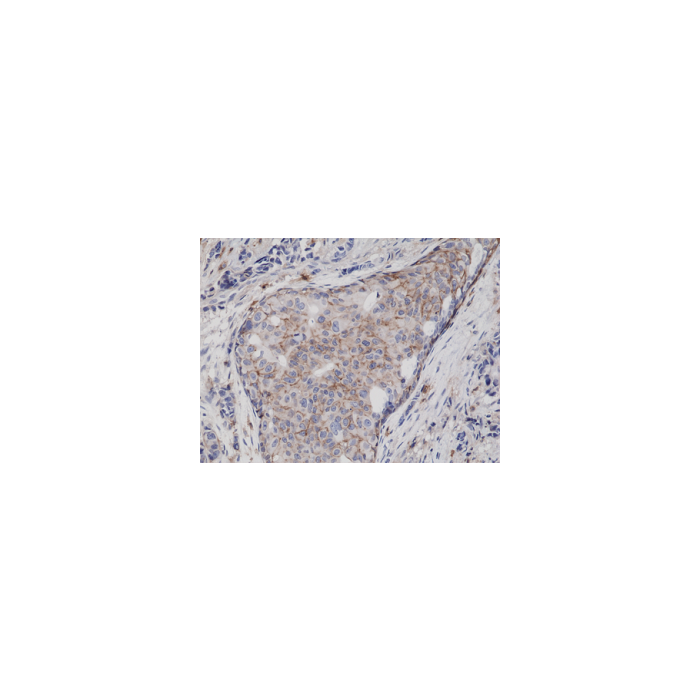Cookie Policy: This site uses cookies to improve your experience. You can find out more about our use of cookies in our Privacy Policy. By continuing to browse this site you agree to our use of cookies.
RevMab
anti-CD44 (human), Rabbit Monoclonal (RM264)

| Product Details | |
|---|---|
| Synonyms | Epican; Extracellular Matrix Receptor III; ECMR-III; GP90 Lymphocyte Homing/Adhesion Receptor; HUTCH-I; Heparan Sulfate Proteoglycan; Hermes Antigen; Hyaluronate Receptor; Phagocytic Glycoprotein 1; PGP-1; Phagocytic Glycoprotein I; PGP-I |
| Product Type | Recombinant Antibody |
| Properties | |
| Clone | RM264 |
| Isotype | Rabbit IgG |
| Source/Host | Rabbit |
| Immunogen/Antigen | A peptide corresponding to the extracellular domain of human CD44. |
| Application |
Immunohistochemistry (IHC): 1:1000-1:5000 dilution |
| Crossreactivity | Human |
| Specificity |
This antibody reacts to the extracellular domain of human CD44. |
| Purity | Protein A purified. |
| Purity Detail | Protein A affinity purified from an animal origin-free culture supernatant. |
| Concentration | N/A |
| Formulation | Liquid. 50% Glycerol/PBS with 1% BSA and 0.09% sodium azide. |
| Isotype Negative Control | |
| Other Product Data |
Click here for Original Manufacturer Product Datasheet |
| Accession Number | P16070 |
| Declaration | Manufactured by RevMab Biosciences. |
| Shipping and Handling | |
| Shipping | BLUE ICE |
| Long Term Storage | -20°C |
| Handling Advice | Avoid freeze/thaw cycles. |
| Use/Stability | Stable for at least 1 year after receipt when stored at -20°C. |
| Documents | |
| Product Specification Sheet | |
| Datasheet |
 Download PDF Download PDF |
CD44 cell surface antigen is a 100 kDa type 1 transmembrane glycoprotein widely expressed on human leucocytes, white matter of the brain and by some epithelial cells of the intestine and breast. Several isoforms of CD44 exist. CD44 is a receptor for hyaluronic acid (HA) and is involved in cell-cell interactions, cell adhesion and migration. CD44 also participates in a wide variety of cellular functions including including lymphocyte activation, recirculation and homing, hematopoiesis and tumor metastasis. CD44 function is controlled by its posttranslational modifications. CD44 is expressed by hematopoietic, non-hematopoietic cells and epithelial tissues. Further, bone marrow myeloid cells and memory T cells express CD44 at high levels, and peripheral B and T cells can upregulate the expression of CD44 in response to certain stimulatory events. CD44 expression may be up-regulated upon some carcinomas, and it has been speculated that this may be related to metastatic potential. Diseases associated with CD44 dysfunction include superficial keratitis and lichen sclerosus. CD44 also may be related to tumor metastasis formation.





